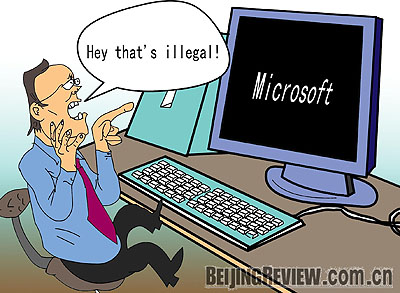
Microsoft came down hard on pirate users of its operating system in China on October 21, causing deep-seated rumblings among many computer users. The company launched its Windows Genuine Advantage and Office Genuine Advantage tools to test the legitimacy of Microsoft software applications in China's computers. Those whose software failed the tests would see a blacked out desktop on the hour, every hour, or a permanent warning against loading pirated Office software.
Explaining the move, the software giant justified its actions on its website as part of its "commitment to help protect its intellectual property and to help you avoid problems before they happen."
Microsoft told Reuters, "The purpose is to help our customers to determine (if) genuine software is installed on their computers," referring to the Windows XP Professional and Office software.
According to Microsoft's statistics, 20.1 percent of pirate users in China believed their computers were installed with the genuine Windows XP Professional system when they purchased a new computer.
Chinese computer users had a mixed reaction to Microsoft's black screen move. Some support this software giant's action, believing it is dealing a blow to piracy with its own technology, but most Microsoft product users are worried that the kind of control shown could lead to an invasion of privacy. Some even argue that genuine Microsoft software is too expensive for ordinary Chinese users to afford.
In response to Microsoft's controversial anti-piracy campaign, a Beijing lawyer has made a submission to China's Ministry of Public Security, complaining that Microsoft's move was the "biggest hacking activity in China, infringing on privacy and damaging information security." More importantly, said the lawyer, it poses a threat to China's national security.
Piracy is always wrong
Qiao Shan (The Beijing News): To maximize its profits is the basic instinct of any business. We can't expect businesses to sacrifice profits for morality.
Most Chinese computer users complain that Microsoft software is too expensive, but it's not only this company's fault. If our domestic computer companies are able to develop similar high-quality software, Microsoft is unlikely to impose so high a price. On the other hand, do we pirated product users have to take some accountability for Chinese companies' failure in software development? In the face of so many pirated product lovers, even if our companies had developed advanced software, maybe on the second day of its appearance, pirated copies would be found everywhere. In this situation, who dares to make investment in software development?
Microsoft does not monopolize today's software market. If we cannot afford expensive Microsoft software, we may turn to other products. When there is more competition, Microsoft will surely consider cutting its prices to win back the market.
